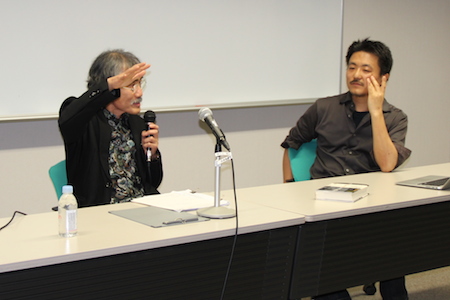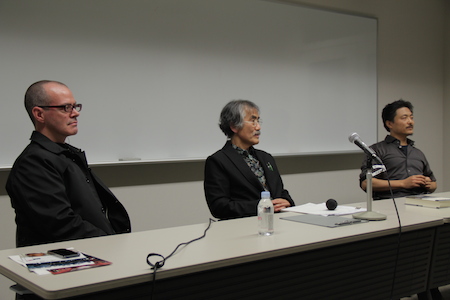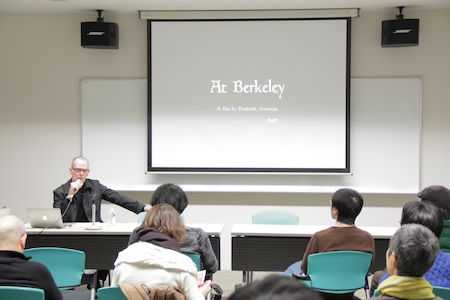[Report] Film Screening: "At Berkeley"
On December 1st, UTCP hosted a public screening of Frederick Wiseman's documentary At Berkeley (2013). Following the screening, Prof. Satō Yoshiaki and director Funahashi Atsushi joined Mark Roberts of UTCP for an in-depth discussion with the audience.

At Berkeley offers an extraordinary portrait of one of the leading public universities in the United States, raising many questions about the state of higher education in the age of neoliberalism. How, for example, should we understand the mission of the public university in the new climate of political and ideological opposition to its traditional, liberal ideals? What, at present, are the shared goals, or contours of conflict between the students, faculty, and administrators?
As a way to give order to the many different views of the university, Wiseman focuses the latter part of his film on a specific conflict: the "Day of Action" protest, held on October 7th, 2010, in which several hundred student activists threatened to occupy the main library reading room. The protesters' goal was to draw public attention to the changing economic fortunes of the University of California, the effects of dramatic budget cuts, and to criticize the response on the part of the administration. By offering a variety of perspectives on a single, contentious event, Wiseman explores the aims and responses of the different stakeholders: students, administrators, and even the representatives of law enforcement.
Following the screening, Satō-sensei drew attention to Wiseman's unique anthropological perspective, as well as how the film channels Berkeley's self-awareness as the legendary "home of the free-speech movement" and the ways in which this both resonates and clashes with the present student protests over fee increases, and the management of Berkeley's legacy on the part of the university administrators. It is striking that ultimately, the representation of student activism in the film is not entirely sympathetic. Satō-sensei also spoke to how Wiseman foregrounds questions of social class intersecting with those of racial identity. This surfaces throughout the film as an ongoing tension between the activists and a number of African-American students, who express puzzlement around the sudden concern for socio-economic disparty.
Funahashi-san also explored the complicated construction of a point of view in the film, and how (and why) this seems to often revolve around the Chancellor's office. He pointed out that Wiseman's method in making his "institutional" films has generally been to approach the highest level of the administration and seek their assistance in the production. One of the effects of this is a strategy in which "ethics and tactics become one". Funahashi also drew attention to the moments in the film that propose a point of view from an extreme distance in time or space, e.g., the stage play that discusses the creation of a time capsule for the future, or the astrophysics lecture at the end of the film. Funahashi-san suggested that Wiseman almost seems to be proposing an impossibly distant vantage point on everything that we see; or, that is, the impossibility of a vantage point.
During the audience discussion, several participants commented on the uncanny experience of seeing inside the university bureaucracy, and how many of the scenes resonated with our own experiences at our own academic institutions. A number of participants imagined a hypothetical film At Tokyo, set at Todai, and how strikingly different it would be without student protests, worry over draconian budget cuts, vertiginous fee increases, lack of commitment to administrative transparency, and so forth.
Given the unusual running time of At Berkeley (over four hours), the post-screening discussion was remarkably lucid and lively. In closing, the members of UTCP wish to express their sincere thanks to Satō-sensei and Funahashi-san for a very thought-provoking discussion.
— M. Downing Roberts, UTCP









